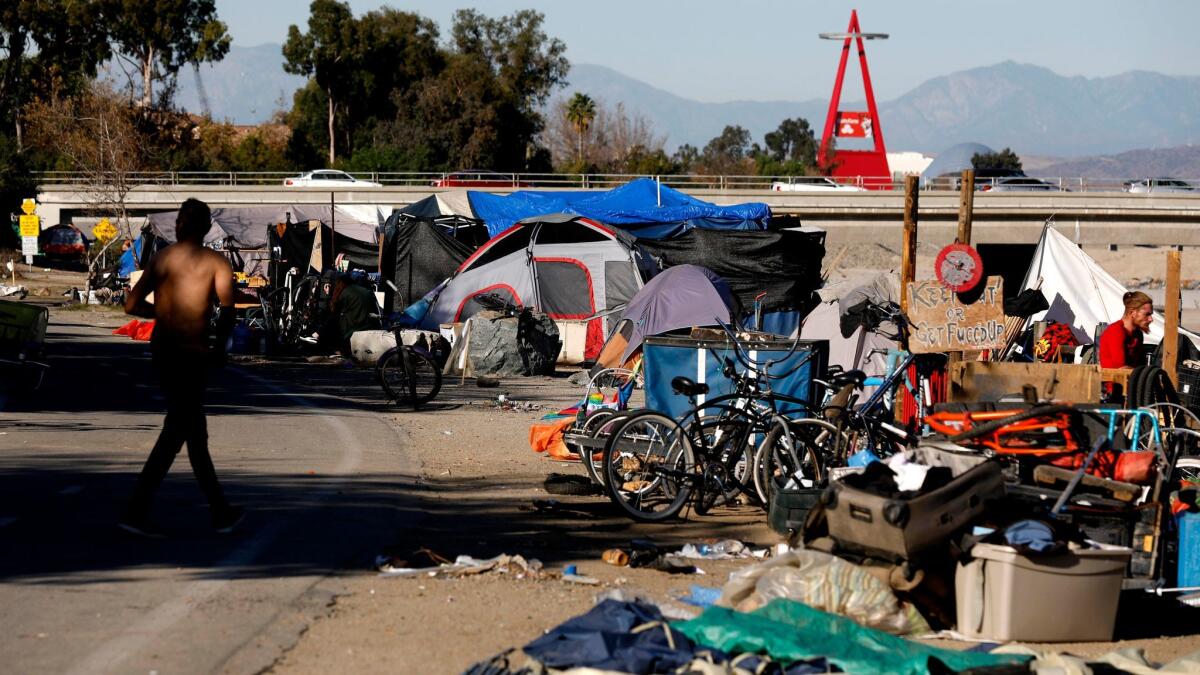O.C. cities and the county must prove homeless crackdown is not discriminatory, judge says

- Share via
The cities of Anaheim, Costa Mesa, Orange and the County of Orange must appear in court next week to prove that their anti-camping ordinances are not being used to criminalize the homeless camped along the Santa Ana River trail, according to a federal judge.
U.S. District Judge David O. Carter has set a Feb. 13 hearing in a lawsuit filed on behalf of people threatened with eviction.
“The court is concerned that persons who leave or are evicted from the riverbed may subsequently be cited by defendant cities under those cities’ anti-camping or anti-loitering laws, even though those persons may not be able to find a shelter or other place to sleep,” Carter wrote in his request, released Sunday.
Many of the more than 500 living in the encampment have disabilities or suffer from trauma that make it difficult for them to stay in small, high-traffic areas such as shelters, according to advocates who sued on their behalf.
Officials at the Elder Law and Disability Rights Center, who filed the lawsuit against the cities and the county, are seeking a temporary restraining order that would halt the removal of the homeless, a process that started Jan. 22.
Since then, the Orange County Sheriff’s Department, along with parole officers and public works crews, has been a steady presence at the encampment, urging residents to pack and prepare for a move. They have arrested individuals for parole violations, but so far, not for trespassing, says Brooke Weitzman, co-founder of the Elder Law and Disability Rights Center.
“People do want to comply” with the removal order, she said. “It’s not that they want to be doing anything wrong. They just have nowhere to go.”
Orange County not only lacks affordable housing or temporary housing that could offer shelter to the homeless, but those being referred to area armories find that those facilities are operating on limited hours, Weitzman said. “It’s desolation all around.”
At the hearing, she will represent seven homeless individuals from the riverbed along with representatives of the Orange County Catholic Worker, a group helping the poor get access to housing and social services.
Carter wrote in his ruling that when all sides meet in court, he is open to input from organizations helping military veterans or those providing housing or protection for abused women. He’s asking participants to bring information on “the number and circumstances of any citations issued or arrests made” under the cities’ and county’s anti-camping and anti-loitering laws since Jan. 1.
Many among the homeless, such as Laura Kasten, who grew up in Fullerton, tell outreach workers that when they’re “finally kicked out,” they may resort to local parks or “anywhere I can set up my stuff.”
“I’m frozen,” Kasten said. “I don’t know where to begin because ultimately, it’s not about our belongings. We can find more discarded things. It’s about being treated with respect and to them, we’re throwaways.”
Twitter: @newsterrier
More to Read
Sign up for Essential California
The most important California stories and recommendations in your inbox every morning.
You may occasionally receive promotional content from the Los Angeles Times.














